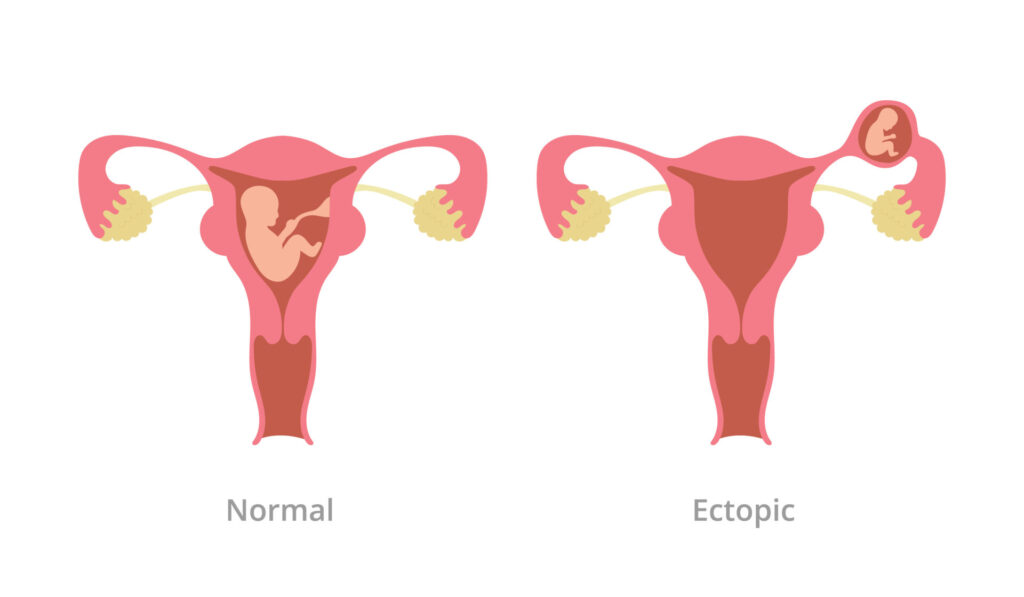What Is an Ectopic Pregnancy? How Can I Know I Have One?
Whether planned or unplanned, pregnancy can happen to any woman who is sexually active and ovulating. In normal conditions, a woman becomes pregnant when the following occurs:
- A sperm fertilizes an egg and forms a zygote.
- The zygote develops into a blastocyst that implants onto the uterine wall.
- After implantation, the blastocyst grows into an embryo, which then grows into the fetus.
Again, those are normal conditions for a pregnancy. If the zygote implants anywhere other than the uterus, that is considered an ectopic pregnancy, which is never viable and could lead to life-threatening complications or require emergency care.
What Is an Ectopic Pregnancy?
An ectopic pregnancy is a pregnancy where the fertilized egg implants anywhere outside of the uterus, including the:
- Fallopian tubes (most common)
- Ovary (rare)
- Abdominal cavity (rare)
- Cervix (rare)
No matter where the fertilized egg implants, if it does not implant in the uterus, it is considered ectopic and is not viable, meaning it cannot grow properly, survive gestation, or reach the stage of childbirth. Only the uterus provides the conditions, nutrients, and other elements required for the fetus to grow and develop.

Are Ectopic Pregnancies Dangerous?
They certainly can be.
In some cases, an ectopic pregnancy can shrink and terminate naturally, resulting in no physical harm or threat to the mother.
However, if there is no natural termination, the pregnancy will continue to grow. If left to continue growing, it can eventually rupture and cause structural damage, internal bleeding, and even death. In these cases, medical intervention is required to protect you, ideally before the embryo reaches the point of rupturing.
How Do You Treat an Ectopic Pregnancy?
There are a few approaches to treating an ectopic pregnancy, which include:
- The wait-and-see method
- Medication
- Surgery
Wait and See
If detected early (within the first six weeks, roughly), your doctor may recommend waiting and seeing if the embryo will terminate naturally. Ideally, it will so that you do not have to worry about it possibly rupturing and threatening your life.
Medication
If your pregnancy does not terminate on its own, your doctor may recommend an injected medication that can stop the embryo from growing before it ruptures, protecting you from the dangers of a hemorrhage or internal bleeding. A medical treatment is only for those whose embryo is still small and not yet ruptured.
Surgery
If the embryo has reached a threateningly large size or has already begun causing internal bleeding, surgery is necessary to treat the bleeding or remove the embryo from its place of implantation (again, usually the fallopian tube).
What Are the Warning Signs of an Ectopic Pregnancy?
Early Signs of Pregnancy
In the early days, you likely will not notice signs of an ectopic pregnancy, similar to how regular pregnancies don’t show signs until the fourth or fifth week. Once signs of pregnancy begin, they are usually the same as a normal pregnancy:
- Breast tenderness
- Nausea
- A missed period
Should you take a pregnancy test, it will come back positive, even if your pregnancy is ectopic.
Signs of Ectopic Pregnancy (Not Ruptured)
If your pregnancy is ectopic, you may start to experience issues like:
- Light vaginal bleeding
- Pelvic or lower abdominal pain
- Dizziness or physical weakness
Signs of Ectopic Pregnancy (Ruptured)
Should your embryo rupture, you can expect serious issues like:
- Severe, sharp pain in the abdomen or pelvis
- Shoulder pain
- Rectal pain or pressure
- Low blood pressure
- Fainting
Should you experience any of these symptoms, seek medical attention immediately.
What Causes an Ectopic Pregnancy?
Ectopic pregnancy occurs when there is interference with the fertilized egg’s journey through the fallopian tube. Whether it’s blocked from exiting or slowed down too much on its way into the uterus, any interference could result in the egg implanting in the tube and outside of the uterus.
Interference can be caused by:
- Scar tissue from a previous pelvic surgery
- Adhesion or inflammation in the pelvis
- Damage from an STI infection or pelvic inflammatory disease (PID)
- Naturally misshapen fallopian tubes
- Growth forming in the fallopian tubes
Risk Factors for Ectopic Pregnancy
- Active IUD use
- Endometriosis
- Getting pregnant after 35
- History of ectopic pregnancies
- History of PID
- Infertility
- IVF treatment
- Previous surgery on your fallopian tubes, ovaries, or other parts of your reproductive system
- Previously tied tubes
- STI infection, especially chlamydia
- Tobacco use
How Can I Know If My Pregnancy Is Ectopic?
It’s almost impossible to know if your pregnancy is ectopic without an ultrasound exam. To protect yourself and ensure your pregnancy is safe and viable, it’s essential to receive a pregnancy test and screening from a trusted team of medical professionals who can determine whether your pregnancy is normal or ectopic.
If you are pregnant or suspect you are pregnant, schedule a pregnancy screening with Women’s Clinic of Atlanta.
Our compassionate staff provides pregnancy testing and limited ultrasound screenings to ensure your pregnancy is not ectopic but viable and implanted in your uterus. Your health is so important; protect it with Women’s Clinic of Atlanta by your side.
Schedule a pregnancy screening by texting “appointment” to 404-777-4771 today.
Women’s Clinic of Atlanta is HIPAA compliant and AAAHC accredited.
Recent Articles:
